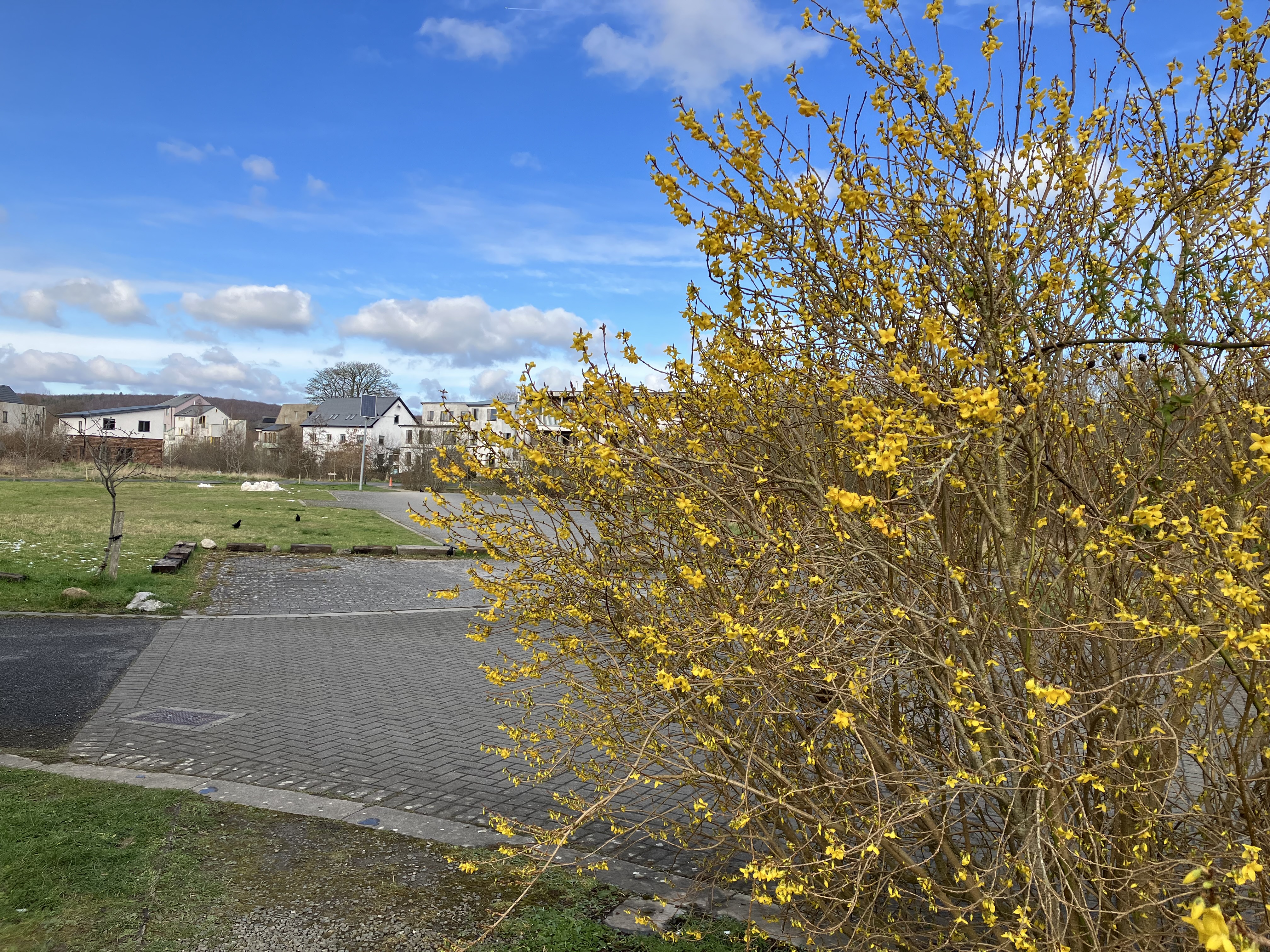
By Kath Baker

In March I was lucky enough to be invited to
Cloughjordan Ecovillage to take part in a Community Climate Coach Training. I have long since been fascinated by community living and have often dreamed of what my ideal community would be like. Cloughjordan had taken on an almost legendary status in my mind, seemingly providing solutions to so many of the challenges that I had seen and experienced with community living, such as the need for autonomy and personal space, but wanting to have access to shared resources, locally grown food and a network of like minded people.
The 67 acre site is owned by the Cloughjordan Ecovillage educational charity, Sustainable Projects Ireland, who facilitate tours and an ecovillage experience for groups who want a taste of what this kind of life entails. However the 133 plots allocated for housing are bought from the charity by members, who live fairly autonomously and are responsible for building their own eco-homes. Cloughjordan Ecovillage sits directly behind the High street of Cloughjordan town, meaning that local shops, schools, pubs and cafes are within an easy stroll of each home. Plenty of community meals, music nights, meetings and work parties keep the community in tune and connected. Take this
360 degree tour of the Ecovillage with Davie Philip, filmed during the covid restrictions.
From small seeds...
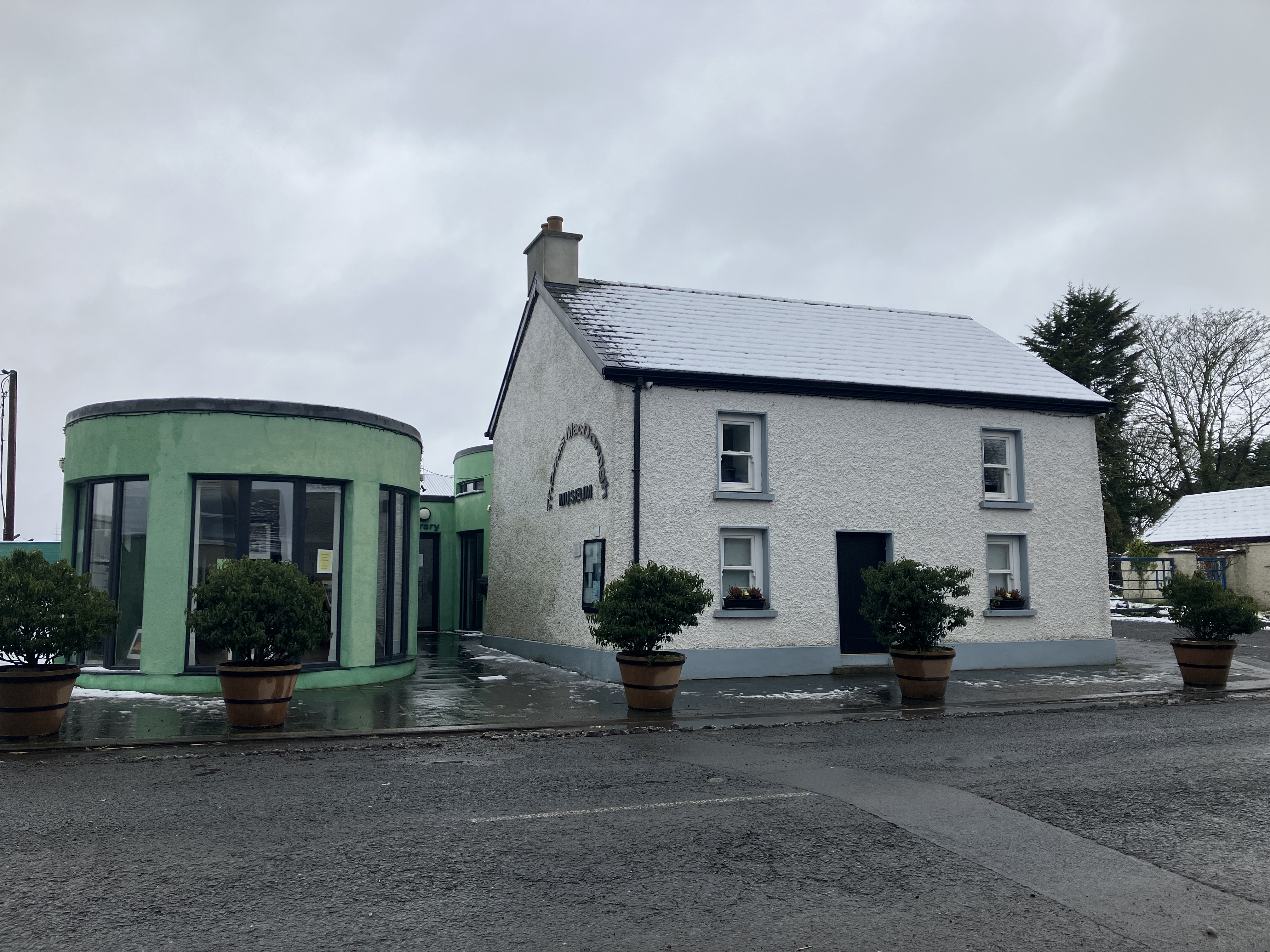
In the late nineties, a group of environmentalists living in Dublin started incubating an idea for an ecovillage. A community where people with a shared vision for a sustainable future could build low impact houses, set up regenerative livelihoods, share collective resources and create a blueprint for sustainable living for the rest of Ireland. Sustainable Projects Ireland LTD, the group that formed to carry and implement the vision, pitched the idea to the public in 1999. The response was positive and the search for land began.
After two years of site visits, a plot was found in North Tipperary. Unlike most of the other sites the group had viewed, this one had the unique position of being at the heart of a pre-existing small rural community, Cloughjordan town. In 2005, both the money for the site and planning permission had been secured to start this ambitious project. By 2009 the first of the residents moved into their newly built eco-homes. Fast forward to 2012, the eco- village had over 50 houses completed or under construction and several emergent community businesses.
Relationship with Cloughjordan Town
 Cloughjordan
Cloughjordan (Cloch Shiurdáin) is a small town, in the North-western part of Tipperary, close to the border with County Offaly. The town holds an 800 year connection with the kingdom of Jordan, ever since a crusading knight brought back a stone from the Holy Land (Cloch means stone or castle). Today the ‘friendship stone’ , gifted by the Jordanian government as a piece of public art, sits at the threshold between the town and the ecovillage to commemorate this relationship. By the early noughties, its population had fallen into a steady decline, reduced to just a few hundred, with many of its young people choosing to move away to neighbouring cities with greater opportunities for work and play. Local schools were struggling, local pubs and shops couldn’t easily sustain themselves with the scant population. The town was dying.
With 50 new dwellings under construction, the Ecovillage brought with it an influx of people, many of whom rented houses in the town. And although initially met with some wariness and bemusement from the locals, the schools started to fill up, trade increased at local businesses, new enterprises emerged and the pubs began to buzz again. Its close proximity to the town and its open gate policy helped with integration and locals were welcomed to come and have access to the recreation fields, the newly planted woodlands and to participate in community activities organised by the new residents. Now the ‘Ecos’ as they are known locally, are well integrated into the Cloughjordan community. Watch this Undercurrents Video filmed at the time that planning had first been granted to find out what the locals really thought about the arrival of the 'Ecos'.
Design Features
 A walk around the site reveals many features carefully designed to both care for the land and the people who access it. The houses have been built in neighbourhoods, each with its own community garden or green space. Every privately owned plot also includes a small garden for personal recreation and growing. Each house is connected to the district heating system, and owners pay a monthly share for access to heating and hot water from the centralised wood chip boiler. The houses themselves are diverse, taking in a range of building styles including cob, straw bale and timber frame kit houses. Some of the houses have now installed solar PV and have taken their energy consumption off grid.
A walk around the site reveals many features carefully designed to both care for the land and the people who access it. The houses have been built in neighbourhoods, each with its own community garden or green space. Every privately owned plot also includes a small garden for personal recreation and growing. Each house is connected to the district heating system, and owners pay a monthly share for access to heating and hot water from the centralised wood chip boiler. The houses themselves are diverse, taking in a range of building styles including cob, straw bale and timber frame kit houses. Some of the houses have now installed solar PV and have taken their energy consumption off grid.
Swales with deep soakaways have been created around the town square and developed areas as a means of protecting the houses against flooding. Patches of forest garden edge communal spaces and pathways. As you walk past secluded beehives, towards the community farm the site opens up into an amenity field, which is widely used by the local scouts, under 12’s football team and as a venue for community events. It is overlooked by a large amphitheatre, which hosts regular live music, plays, spoken word and a fortnightly ‘pop-up Gaeltacht’, to celebrate the Irish language revival in Cloughjordan.

As part of their commitment to biodiversity and safeguarding Ireland’s natural heritage, 17,000 native trees have been planted, creating a zone 5 spanning one third of the site. Hidden deep in the woodland is a hidden labyrinth, encouraging visitors to take a contemplative walk around its grassy curves. Located between the community allotment plots and willow arched sensory and wildlife garden is the apple tree walk, in which you are flanked by Irish heritage apple trees, some ancient varieties which were on the brink of extinction, possibly deservedly according to residents’ reports of their unremarkable flavour.
As you continue past the teaching polytunnels, you come across the
RED Gardens. These research, education and demonstration gardens have been developed and managed by Bruce, who conducts numerous growing trials throughout the season, to ascertain what is the best way to grow food. His 'experimental vegetables' are sold for donations from the fridge at the back of his house. Beyond the RED Gardens lies a huge bank of solar panels and WeCreate, a large purpose built social enterprise and innovation centre, which houses the community food hub, co-working space and fablab, their makery and fabrication workshop.
Community involvement.
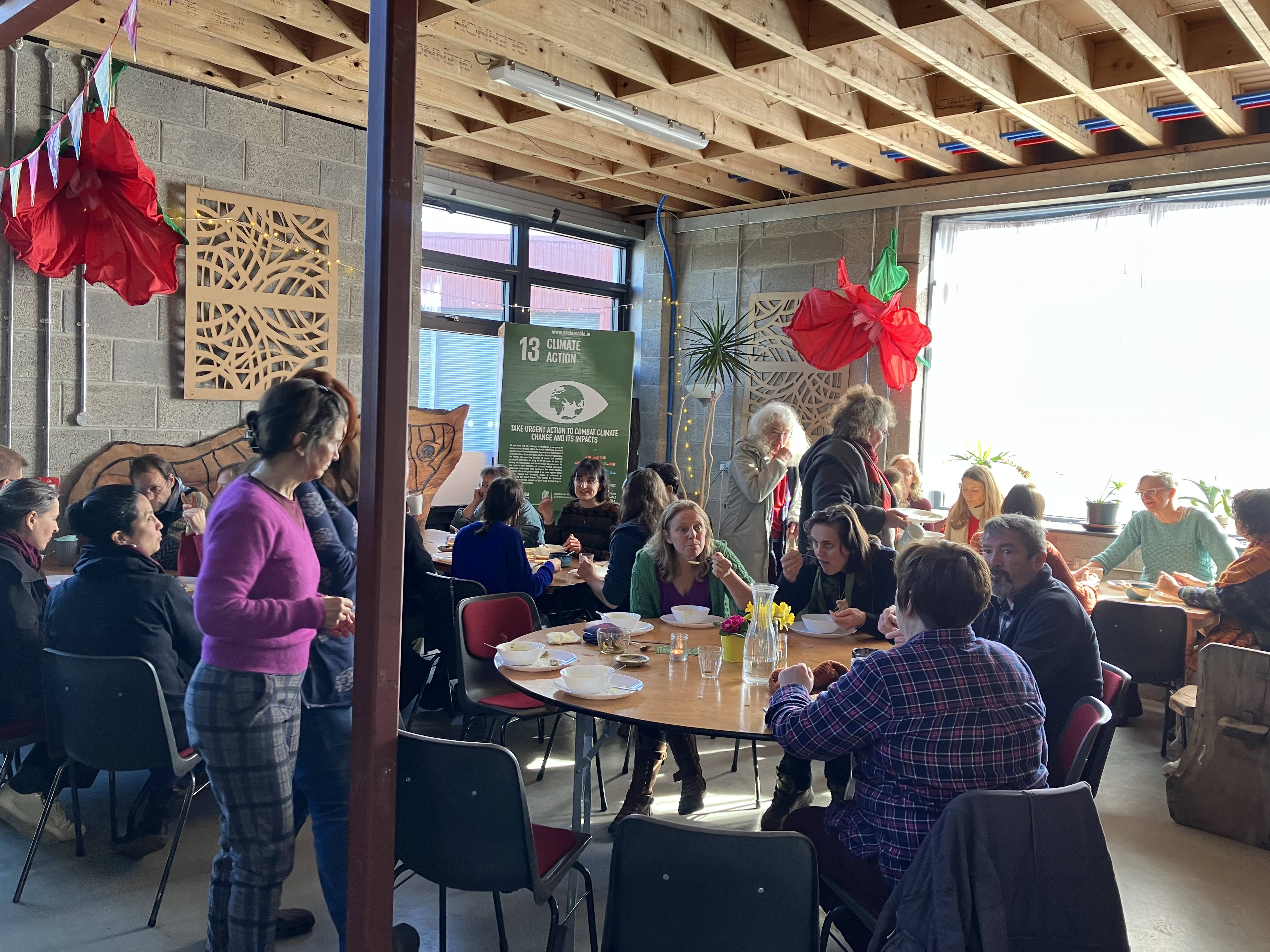
Consensus decision making has informed every step of the evolution of the ecovillage from its location, design and operation. Everyone who lives at the ecovillage becomes a member of Sustainable Projects Limited and signs an ecological charter, which has been co-created to ensure that all building and energy consumption on site meets an agreed environmental standard. The success of this is evidenced by the average eco-villager footprint being 2gha, less than half the global footprint of the average Irish person.
A community lunch takes place once a week at the Food Hub Space in the Wecreate centre. Ecovillagers come together to share soup made from Cloughjordan Community Farm produce, Riot Rye sourdough, an abundance of homemade cakes and to enjoy a catch up.
Eco-villagers also commit to doing 100 hours of work towards the betterment of the community each year. Working groups have been established for all areas of community development, including land maintenance, group visits and communication. Each member chooses which working groups they would like to be involved with and carries out their community hours within these groups.
Challenges
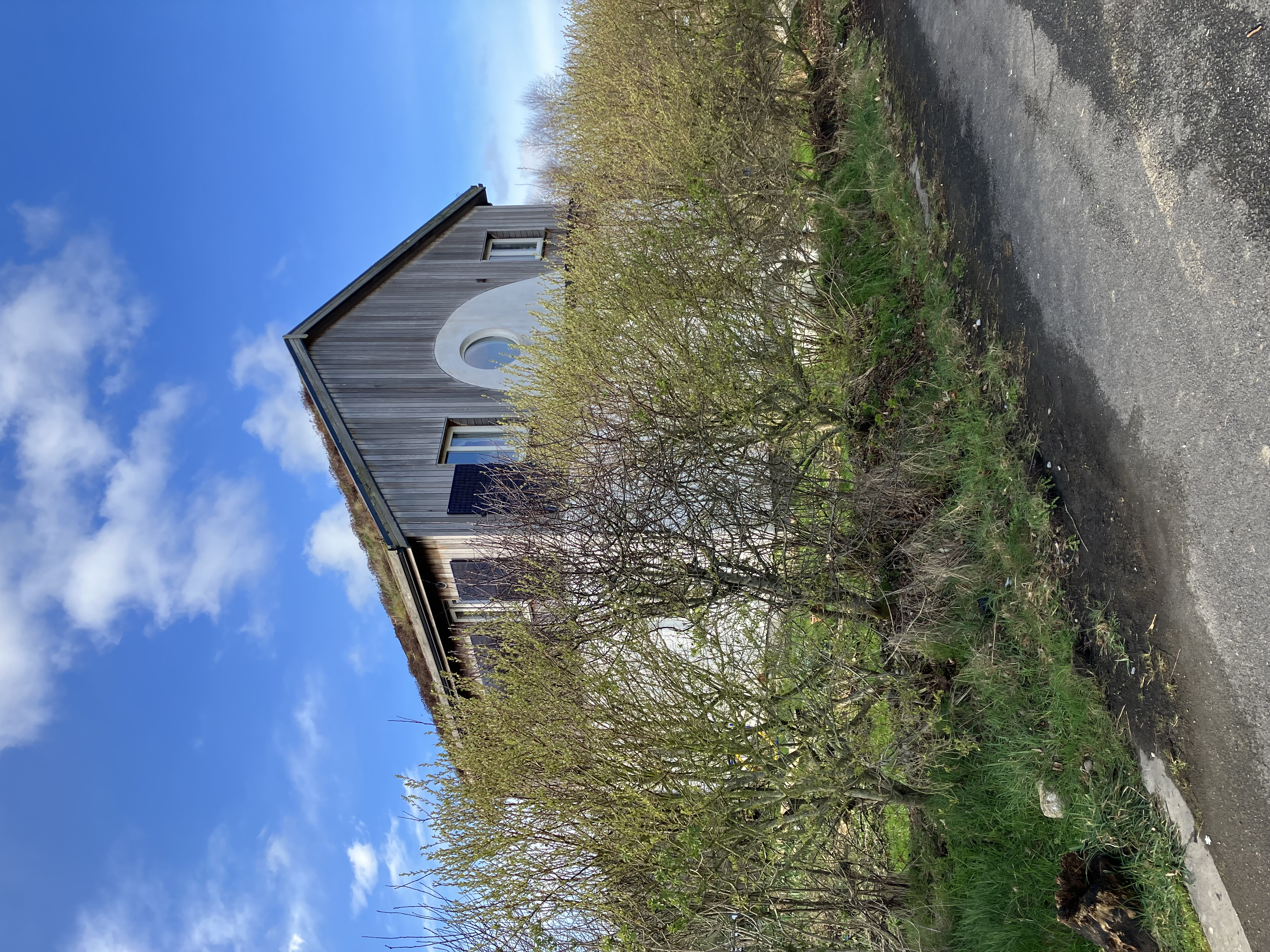
As one would expect from a project of this scale, the ecovillage has faced many challenges along the way. The economic crash of 2008, forced half of the investors to withdraw from the project. Despite this they still managed to pull enough resources together to secure the land and begin the construction of 50 of the planned 133 housing units within a year of this setback.
Although planning was initially granted for all of the proposed houses, the ecovillage currently faces a planning embargo, because the local wastewater treatment plant and sewerage system is at capacity. The community have been looking for green solutions to this issue, including creating reed bed filtration systems, large scale urine collection and humanure composting, but the way forward is yet to be agreed on with the local council and Irish water.
It is also not a cheap option to live in the ecovillage. The price of individual plots, architect's plans and a bespoke eco-build prices it out of the range of many people who aspire to live here. Some have found work- arounds in terms of renting vacant houses, multiple occupancy homes or living in the town but still accessing the eco-village resources. Some properties have also been made available to house interns and sanctuary seekers. A regenerative model for social housing at the ecovillage is one of the things that is currently being developed by newly formed cooperative
Cloughjordan co-Housing.
Enterprise at Cloughjordan
Unsurprisingly, given the amount of vision it takes to birth an ecovillage, many creative, community focussed businesses are blossoming in Cloughjordan. Inspired by the solidarity economy model, many of the on site enterprises prioritise social profitability, democratised governance and intra- business collaboration and trading. Rather than being based on an infinite growth model, businesses here have been designed to meet the needs and scale of their community, with some serving as incubators to support the development of similar enterprises in neighbouring communities.
 Cloughjordan Community Farm
Cloughjordan Community FarmOccupying 8 acres of land at the ecovillage,
Cloughjordan Community Farm is a Community Supported Agriculture (CSA) initiative that produces a weekly veg share for 75 families in the ecovillage and Cloughjordan town. Each family pays €16 per week, which entitles them to help themselves to the produce that is dropped off at the collection point every Monday and Thursday.
Vegetables are all grown organically, using regenerative and biodynamic principles by head grower Pat and a team of interns. The internship programme, funded by the European Solidarity core, provides a year’s worth of training, accommodation and small stipend for up to ten interns between the ages of 18-30. This funding also pays the wages for a part time coordinator and mentor for the interns, who enjoy a structured training programme in regenerative horticulture. Find out what community farm customer Elaine Kelly thinks about her veg share in this
video.
Riot Rye
Riot Rye is a community supported bakery, making award winning sourdough bread using organic flour all baked in a highly efficient, wood fired, heat retaining masonry oven. The capacity of the oven limits the bakery to production of 350 loaves per week, which are sold mainly to local residents via a bread subscription scheme or through the Open Food Hub. They supplement their income by running baking courses and are affiliated with both the Real Bread Campaign and Real Bread Ireland. Watch Joe Fitzmaurice from Riot Rye introduce his
common bread manifesto here.
The Open Food Hub
Established as part of the Open Food Network, this is an online farmers market, which brings together local producers and consumers every fortnight. Local bread, vegetables, gourmet mushrooms, cheeses, baked goods, ready meals, juice, honey, cut flowers and crafts are available from 30 local producers can be ordered and paid for through the
Food Hub website. The goods are dropped off by producers at the food hub, each member’s order is boxed up and collected. The Food Hub takes a small percentage of each item sold, which supports the running costs of the scheme. Food Hub Coordinator Mel White explains how it all works in this short
video.
Wecreate Centre and Fablab
Wecreate is a green enterprise centre, offering affordable co-working space, a venue for the Food Hub and an event room that is used for training and community gatherings. Fab Labs are a network of small digital manufacturing workshops based on a model from MIT in the states. They set out a series of computer controlled equipment, including a laser cutter and 3d printer which allow users to make almost anything.The WeCreate workspace allows for prototyping and small volume production to assist emerging businesses. Watch this
video to hear Davie Philip from Cultivate explain how a Fablab works.
 Cultivate
CultivateCultivate is a national NGO and Civil Society Organisation focused on education, communication and citizen engagement. They work with local farmers, community groups and local and national government to build a practical vision of a resilient and regenerative Ireland. Areas of focus include teaching permaculture, providing the Global Green area of the Electric Picnic, Ireland’s largest music festival, running their own gatherings around food sovereignty and fostering self reliance in rural communties.
Cultivate have recently received funding to pioneer a programme for local climate coaches in County Tipperary, where they will train community leaders to support and engage communities to become more climate resilient. This programme has been developed as part of their role as lead partner in the Community Climate Coaches initiative, which they have been developing alongside the Permaculture Association and several other European partners.
Conclusion
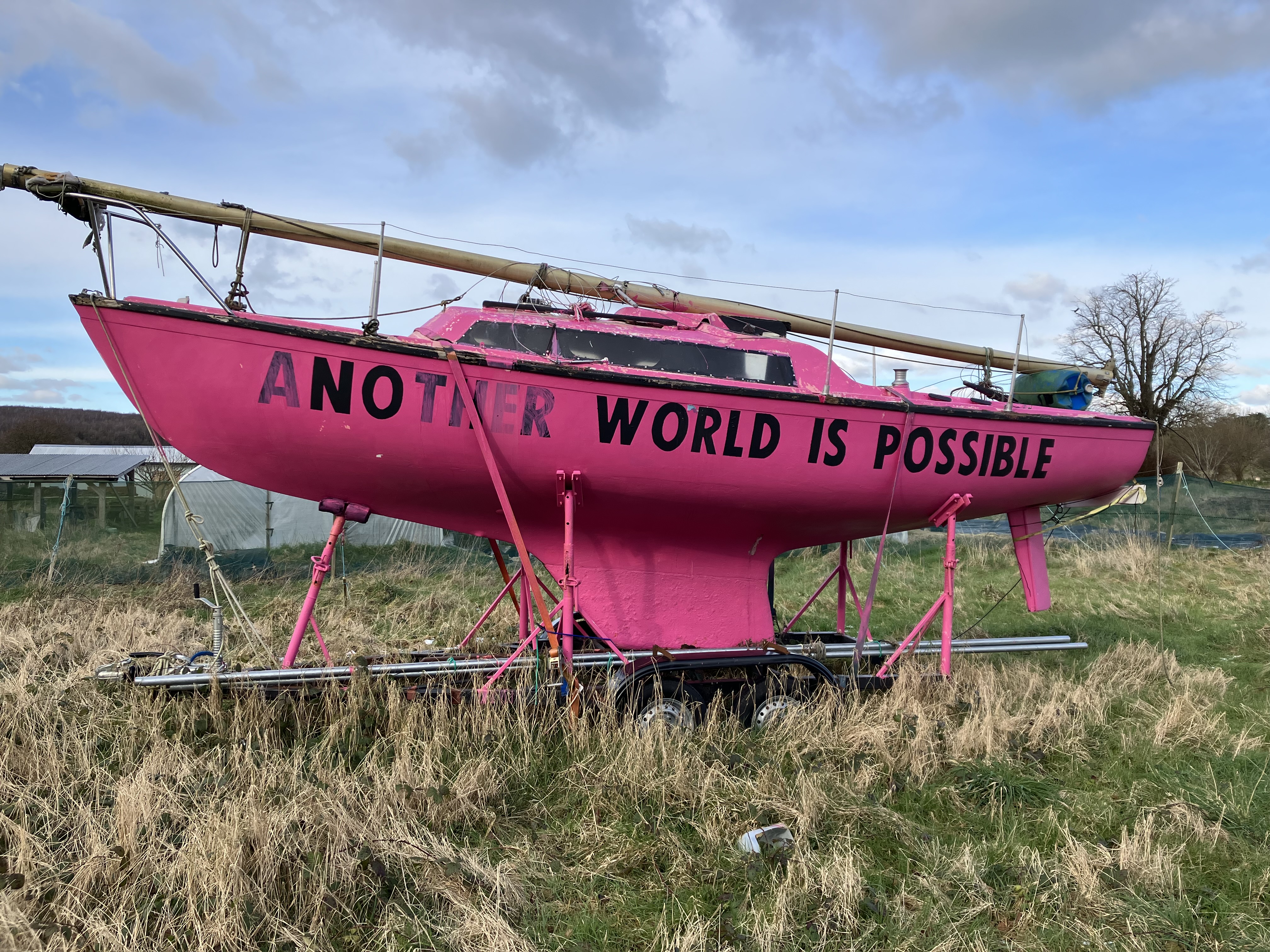
Would I choose to live at Cloughjordan Ecovillage? Possibly, yes. I found it an infectiously warm place, full of people who are committed to a vision of a more sustainable and nourishing life, with a seemingly unlimited supply of pesto. Who wouldn’t want to be around that? I am somewhat daunted by the prospect of building my own house, most of which seemed to be more suited to housing a large family, but am interested in the social housing solutions that are being developed.
The opportunities for sourcing local produce through the farm, food hub and local buyers cooperative were impressive and it seemed that there was plenty of opportunity to get involved with others through community meals, festivals, working groups and sharing a sociable pint. I am hugely looking forward to visiting again in the summer months to deepen burgeoning friendships and to see Cloughjordan Ecovillage in full bloom.